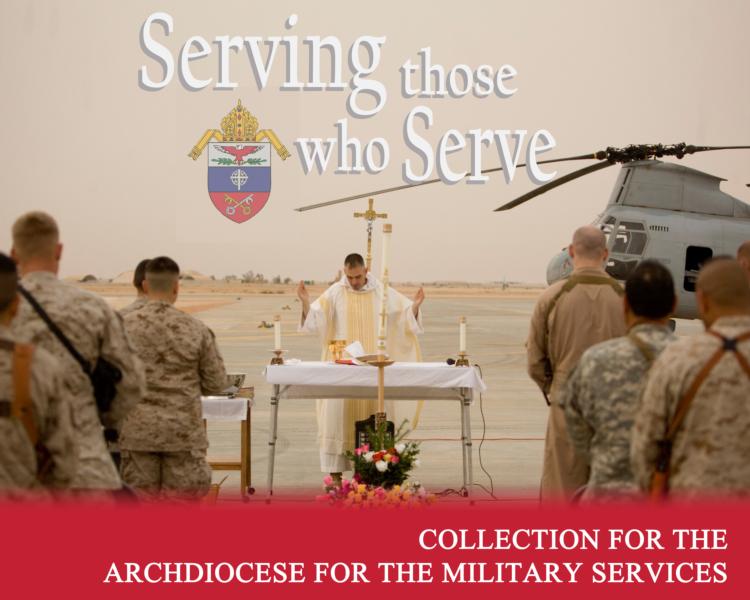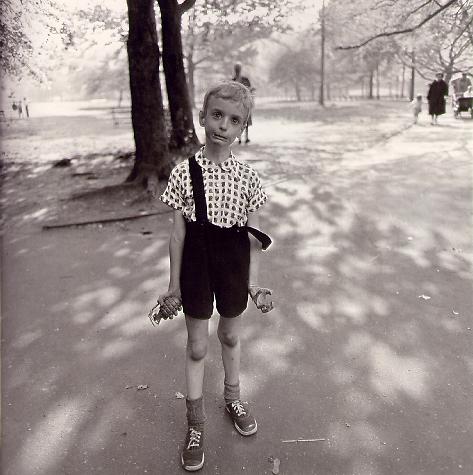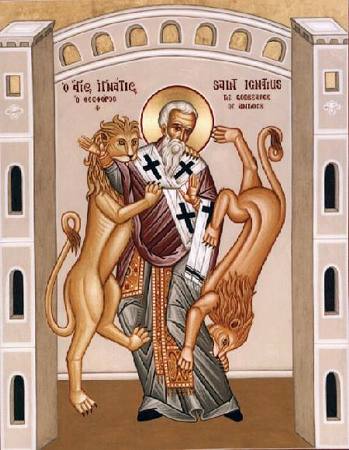
National AMS Collection Poster
**********The following was written by Rev. Emmanuel Charles McCarthy.**********
Here is the poster that has been sent out for every Catholic diocese and parish in the U.S. to display on behalf of the coming first-time-ever National Collection for the Catholic Military Archdiocese. The buzz phrase to entice people to contribute to the collection is “Serving those who Serve.”
“Serving those who Serve.” This is a heart-grabbing, marketing-speak sound byte that purports to say everything that needs to be said, but in fact communicates nothing except, “Open your wallet.” It is well chosen for a culture that has been labeled the “sound bite society.”
The problem with the sound byte, the ideograph, the one-liner, the catchphrase is that its catchiness overshadows the broader context in which it is spoken or written and thereby misleads people about the truth of the matter being presented. Senator James DeMint once said, “There is a reason why most politicians speak in sound bytes: Once they get out of that they open themselves up to questions.”
“Serving those who Serve” is similar to Notre Dame’s PR fund raising campaign sound byte strategy, “We teach values.” Of course Notre Dame teaches values, what educational institution doesn’t? There is no such thing as a value-free education. But what values does it teach by word and by example as genuinely worthwhile? Whose values does it teach by word and example? The values taught by Jesus? Or, are there values contrary to the explicit teaching of Jesus in the Gospels that are being taught? Or, both? One would have thought that a University that designates itself as Catholic and hence is utterly dependent on Jesus for its very existence and meaning would have no problem saying in a fund raising campaign, “We teach Gospel values,” or “We teach Jesus’ values.”
The Catholic Military Archdiocese is about the same process as was Notre Dame except with a different modus operandi geared to a different audience. The poster for its national collection accurately states, “Serving those who serve,” as Notre Dame’s fundraising program aimed at national television audiences and secular corporations accurately stated, “We teach values.” Who can be against teaching values? Who can be against serving those who are serving others? But, what values are being taught? How are the Catholic military chaplains serving those who serve?
Since men and women in the military are engaged in the violence of killing and maiming other human beings, does the Catholic Military Archdiocese serve those who serve by making sure that each and every young Catholic recruit that comes into the U.S. military is thoroughly informed of the two, the only two, moral positions in relations to war that a Catholic may employ in order to evaluate whether the killing he or she is ordered to do is murder? How often do Catholic military chaplains give sermons or deliver platoon or company wide catechetical presentations on these two ethical options, i.e., the nonviolence and love of enemies tradition proclaimed by Jesus and the Catholic just war tradition initiated by Ambrose and Augustine in the late fourth century? Would not human reasonableness, spiritual honesty and moral rectitude in regard to those in one’s spiritual care demand, that since Catholics in the military are to be engaged in killing and maiming human beings, they should be well aware of what Jesus and their Church teach on the subject of killing and maiming other human beings? Is presenting this information accurately, coherently, intelligibly and in a pedagogically sound manner to those immortal souls in its spiritual care, the way the Catholic military chaplaincy “Serves those who Serve?”
And, those whom the Catholic Military Archdiocese is serving, the Catholic military personnel, who are they serving? Jesus? If it is not Jesus, is the Catholic Military Archdiocese serving them spiritually by making it clear to them, as Catholics, that they cannot serve two masters—and what the logical network of moral obligations that derive from this truth is for a Baptized person who has irrevocably committed his or her life to Jesus as Lord, God and Savior, the Way, the Truth and the Life? Or, are the Catholics in the military being served by being led to believe, implicitly and/or explicitly by the Archdiocese of Military Services and/or its military chaplains, that killing and maiming other human beings on orders from the rulers of a kingdom of this world is serving Jesus?
When the above poster was sent to every Catholic parish in every Catholic diocese in the U.S., a letter accompanied it from the Military Ordinary, Archbishop Timothy P. Broglio, which reads in part:
Dear Fathers,
How can we, as witnesses to the Gospel, be there for those who put so much on the line to defend our nation?
Here again we encounter the heart-tugging, fog of war rhetoric calculated to elicit an unreserved, emotionally laden, positive response to a question that camouflages the truth of what the priest is being asked to religiously support?
So, I will restate the question so that it is unambiguously forthright about what the parish priests in the U.S. are being asked to support by the Military Ordinariate’s Archbishop:
“How can we, as witnesses to the Gospel, be there for those who put so much on the line to defend our nation and empire by killing and maiming other sons and daughters of the ‘Father of all’ and even killing and maiming fellow Baptized members of the Body of Christ, whom they have never met but whom they have been told are their enemies?”
By just this small addition to the Military Archbishop’s sentence to the priests, an addition that is 100% factually accurate, Catholic parish priests—and their Bishops—around the country would have clarity of mind about how much they, “as witnesses to the Gospel,” are being asked to put on the line in order to support in conscience before Christ-God this collection.






